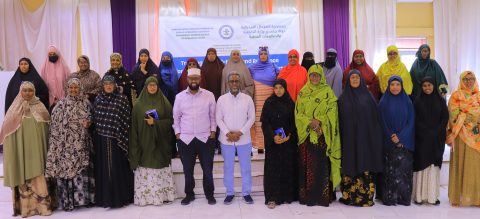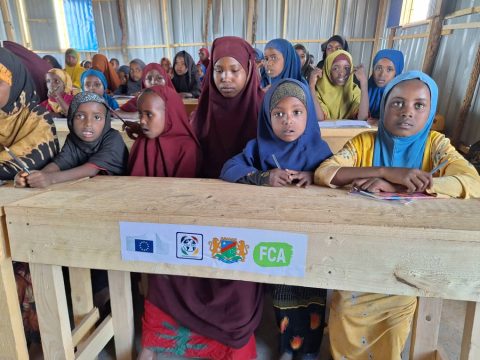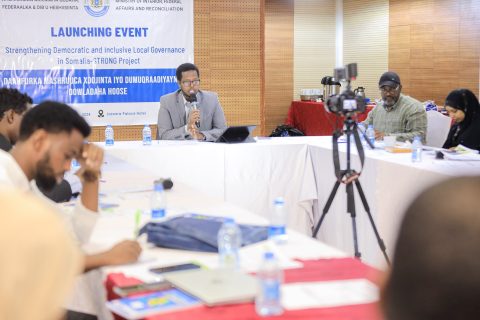i-LEARN project brings displaced Somali children quality education “right to our doorstep”
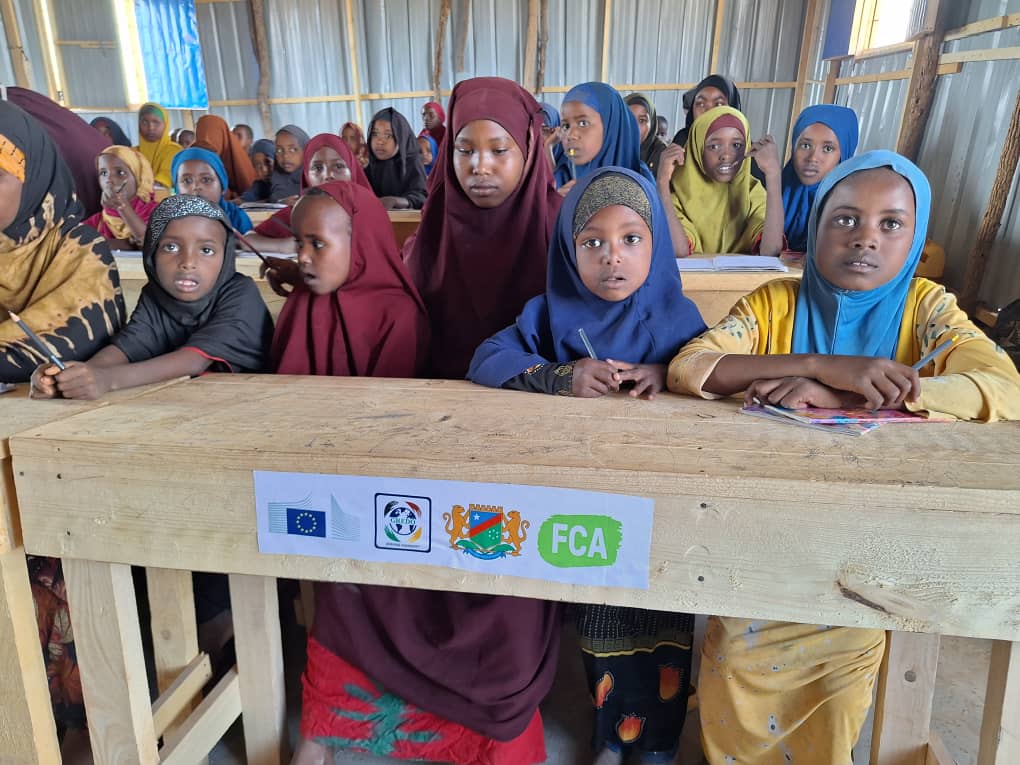
In Somalia, millions of children lack access to formal education. FCA’s EU-funded, i-LEARN project is bringing quality education to displaced families.
“WHEN WE CAME to the camp, I wanted to go to school, but there were no schools here. It was hard to imagine ever getting an education.”
Siyat Mohamed Hussein is a 14-year-old boy living in the Wargeweyne camp for displaced people in Elbarde District, Somalia. Before FCA came to the area, Siyat had never had the opportunity to attend school, despite his deep desire to learn. His family had been displaced multiple times due to insecurity, and the lack of nearby schools meant that education seemed like an impossible dream.
Somali children face barriers to quality education
Since the collapse of the Somali government in 1992, the Somali population has faced numerous challenges, with education being one of the most severely impacted sectors.
According to a report from the United Nations Office for the Coordination of Humanitarian Affairs (OCHA), in 2024 between 3.6 million and 4.9 million school-aged children will lack access to formal education. Furthermore, nearly 2.4 million children will need humanitarian assistance to enable them to begin, return to, or remain in school.
Recent years have witnessed significant progress in educational access, largely due to the support of various international partners, including the European Union, United Nations and direct support from national governments.
Despite these advancements, many Somali children continue to encounter substantial barriers to quality education. These challenges are exacerbated by recurring climate-related hazards, insecurity, and frequent droughts and flash floods, which disrupt children’s right to education, displace families, and, tragically, result in the loss of children lives.
The primary obstacle to school enrollment and retention in Somalia is the financial burden associated with sending a child to school, with displaced communities being disproportionately affected.
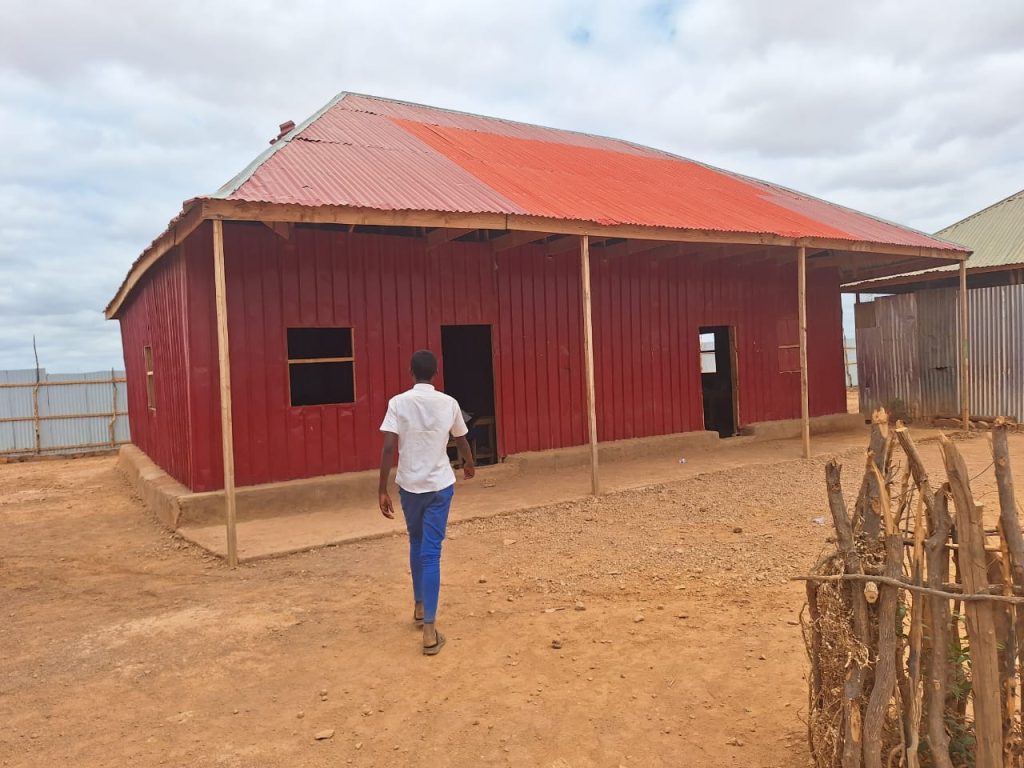
“It brought education right to our doorstep”
Siyat experienced these obstacles firsthand. After arriving at the camp with his family, and like many other children in the camp, he had no access to formal education. The nearest schools were too far away, and without any support, the distance and cost made it impossible for him to attend. Displacement, insecurity, and the lack of infrastructure were constant barriers to his education.
Through an EU-funded project called Inclusive, Lasting Education Achievement (i-LEARN), FCA adopted an integrated approach to support education access in Hudur, Baidoa, and Elbarde in South West State of Somalia. The project is implemented in partnership with GREDO (Gargaar Relief and Development Organisation), a Somali-based humanitarian organisation.
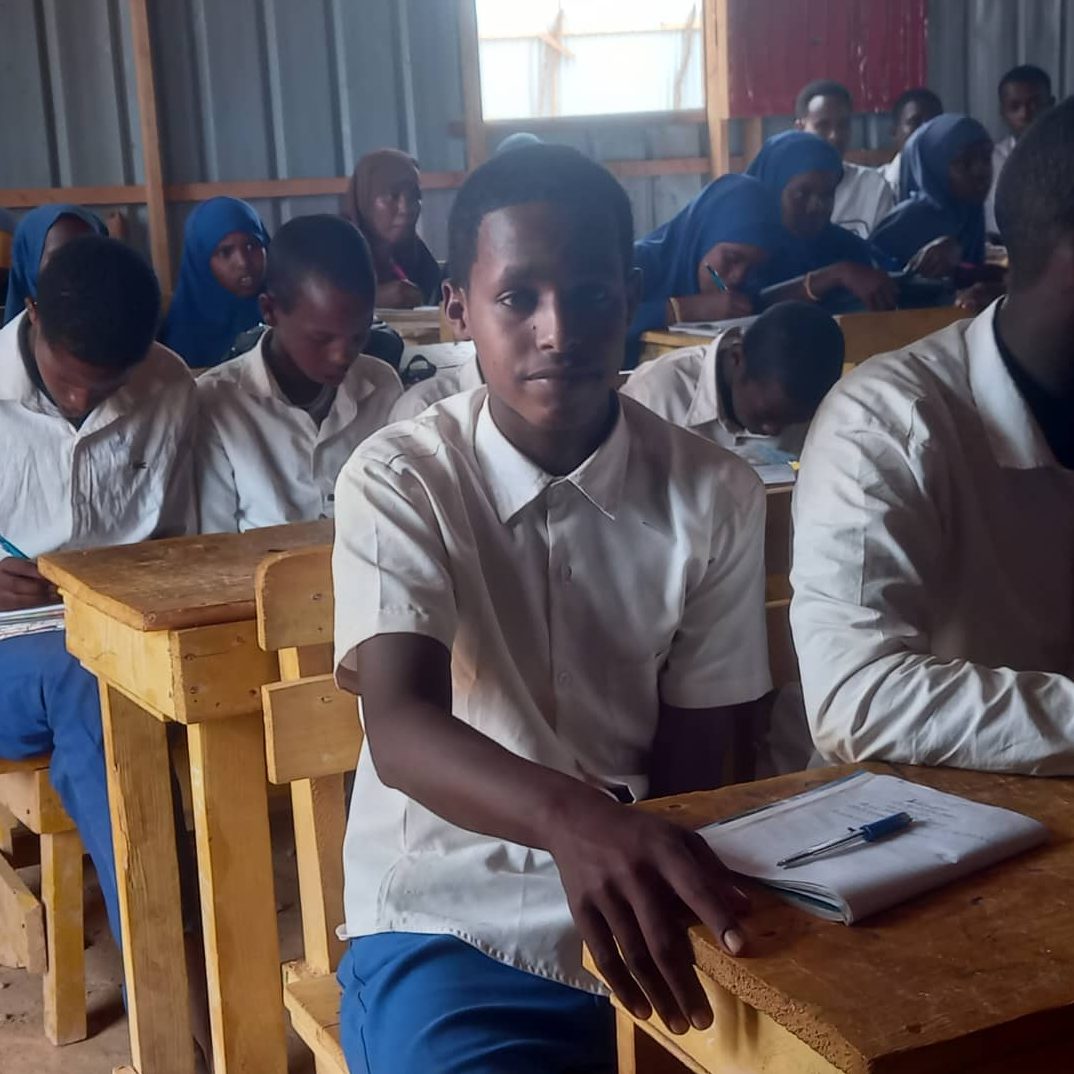
A notable initiative of the project is the establishment of Emergency Community Learning Centres (ECLCs), which have enabled approximately 3,500 newly displaced children to access educational opportunities. These centres, set up by FCA in three major settlements for displaced people across the targeted districts in 2024, are designed as semi-static but movable structures to accommodate the needs of displaced populations. Each centre is equipped with disability- and gender-sensitive twin latrines with handwashing facilities, ensuring that children have access to essential hygiene support. Additionally, the centres are furnished with desks and other learning materials to facilitate effective learning support for these children.
“The ECLC changed everything for me,” Siyat explains. “It brought education right to our doorstep. I didn’t have to walk long distances or worry about missing out anymore.”
Much more than just a learning space
FCA’s approach went beyond just building a learning space. The Somalia team actively engaged the community, ensuring that the centre become a safe and accessible learning environment for children. Teachers were recruited from the local area, trained to handle the unique needs of displaced children, and equipped with the skills to teach basic numeracy and literacy effectively. This comprehensive support system allowed learners like Siyat to start their educational journey without further delays.
Siyat’s teacher recalls the challenges they faced initially: “When we first started, many children were shy and unsure about learning. They had been through so much already, and some had never been to school. But slowly, we saw them opening up, becoming more confident, and eager to learn. Siyat was one of the most enthusiastic students.”
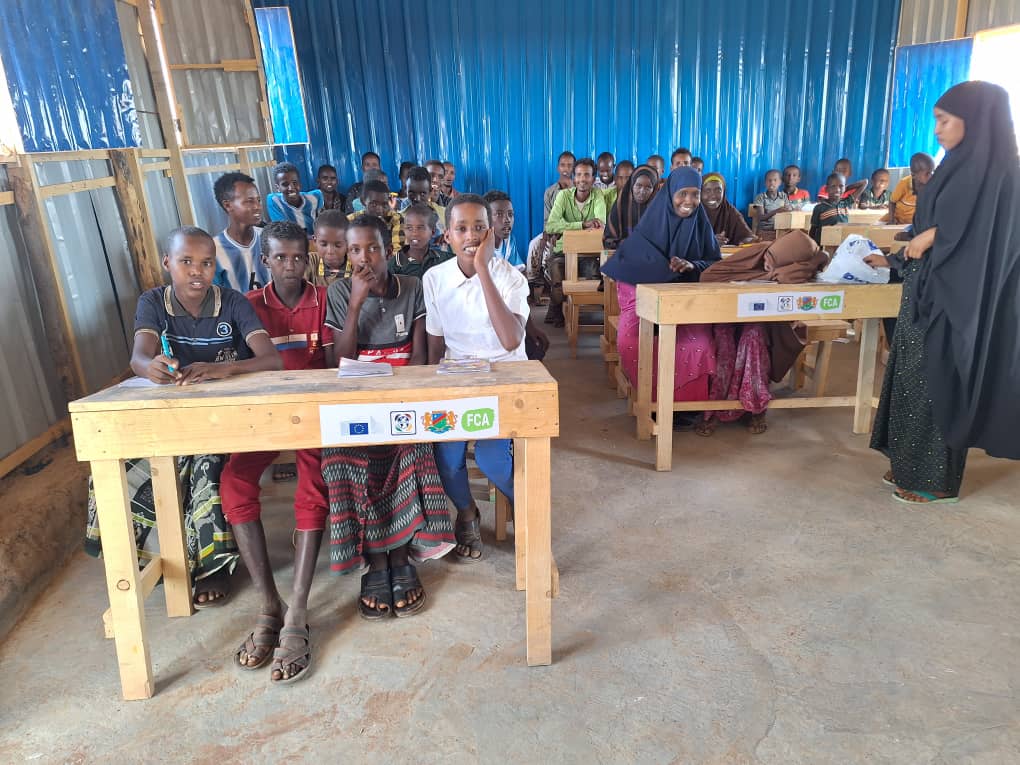
Targeting 17,800 crisis-affected children, the project is dedicated to restoring safe, protective, and high-quality education opportunities, especially for those in remote areas like Hudur and Elbarde. This will then help them to enter or return to school in these regions. FCA also recruited and trained teachers to ensure the quality of education and provided desks, chairs, and other essential learning materials.
Since joining the ECLC, Siyat has made remarkable progress. He has now transitioned from the learning centre to Bula Shidle IDP School, where he continues his education. The centre not only gave him the opportunity to learn basic literacy and numeracy, but it also opened doors to formal education that he had previously thought were closed to him.
“I now go to school every day, and I dream of becoming a teacher myself,” says Siyat.
Continuous learning, even outside of the school year
Upon admission to the centre, newly displaced learners undergo a learning assessment conducted by newly recruited teachers, with support from a committee established by FCA. Following this assessment, students participate in a catch-up learning programme focused on basic numeracy and literacy skills. This can last between three to six months, depending on their individual levels, ages, and abilities. After this period, learners are reassessed to evaluate their reading and numeracy proficiency. Based on their assessment results, they are transitioned to either formal or non-formal educational settings in nearby schools.
School-aged children are placed in formal primary schools according to their age and abilities, while those who are overage join the Accelerated Basic Education (ABE) program in nearby target schools supported by FCA.
Siyat’s father Mohamed Hussein, shares how the ECLC has changed their lives: “Before the ECLC, we didn’t know how our children would ever get an education. Now, my son has hope, just like other children across the country. The ECLC brought opportunity to our camp.”
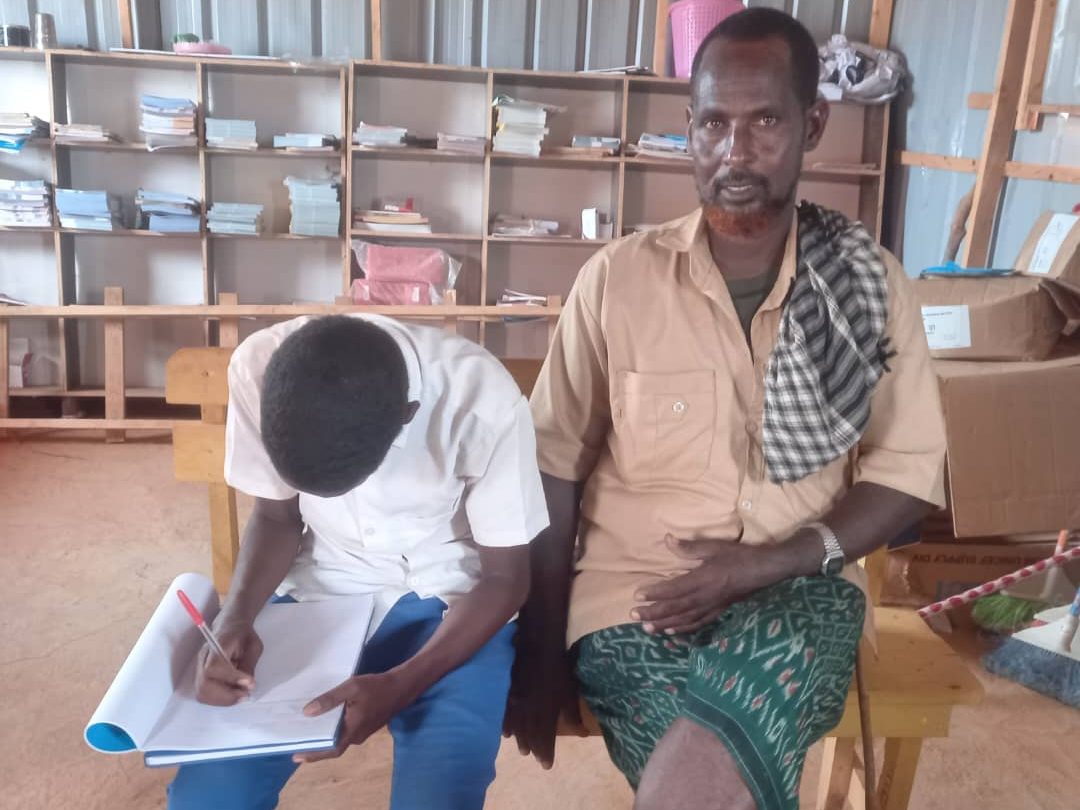
Importantly, the learning programmes at these centres operate continuously, both during and outside the academic school year, until the project concludes in June 2026. At that point, leadership of the centres will be handed over to the established camp education committees, which FCA will train and support to ensure sustainability of these learning opportunity at the settlements for newly arrivals.
Support beyond the classroom
FCA has also appointed child protection focal points at each centre, selected from among the centre’s teachers. These focal points have received training on child protection and safeguarding, equipping them with the skills to identify children facing protection concerns, distress, or harm. They are responsible for providing support or referring children to relevant service providers within the settlements. Additionally, recreational materials are provided to promote play and ensure that children have a positive psychosocial wellbeing experience during their time at the centres.
The success of the ECLC initiative highlights several key lessons. First, bringing education directly to displaced communities is crucial in ensuring that children like Siyat can continue learning despite the challenges of displacement. Secondly, creating a safe and supportive learning environment is essential for helping children overcome the trauma of displacement and focus on their education. Finally, tracking and supporting children as they transition from emergency learning centres to formal schools ensures long-term educational success and retention.
Siyat’s teacher enthuses: “It’s amazing to see how far he has come. Siyat has not only learned to read and write, but he’s also developed a love for learning. He helps his classmates and always asks questions. I have no doubt he will achieve his dream of becoming a teacher.”
—
The i-LEARN project, aims to widen inclusive access for displaced children in Southwest State. The initiative is part of FCA’s European Civil Protection and Humanitarian Aid Operations (ECHO) funded Education in Emergencies (EIE) project, in collaboration with our partners, GREDO, Daf Somalia, and the Ministry of Education in Southwest State.
—
Text: Aburus Farah and Mohamed Eisse
Photos: FCA Somalia
Learn more about our work in Somalia
